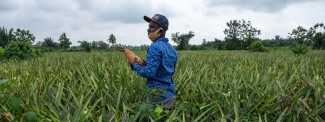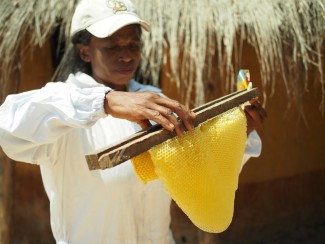Adopting such standards in LDC production offers promise, but work remains
The COVID-19 pandemic has been unsparing in its impact on the global economy, wiping away years of valuable advances in economic, environmental and social development. While all economies have been affected, least developed countries (LDCs) have experienced a particularly harsh blow.
The Sustainable Development Goal (SDG) target 8.1 to attain “at least 7 per cent gross domestic product growth” each year for LDCs already was proving difficult to meet, even with some improvements in prior years. Now, it looks increasingly out of reach.
The crisis has been especially damaging for LDC trading prospects. The latest World Trade Organization (WTO) figures for the first half of 2020 show that merchandise trade exports from LDCs dropped by 16% – greater than the 13% drop in global exports. LDC services exports saw an even larger cut, by 38-40%.
While the more recent impacts of COVID-19 on LDC exports are still pending the necessary data, it is already clear that SDG target 17.11, with governments pledging to “significantly increase the exports of developing countries, in particular with a view to doubling the least developed countries’ share of global exports by 2020,” has now been missed. Even before COVID-19, the prospects of this target being met were slim.
The full extent of the pandemic’s impacts will not be known for months, likely years. Already, supply chain disruptions have highlighted the fragility of global value chains, especially for those producers involved in activities that have low levels of value addition. To rebuild, especially in LDCs, creative solutions that draw from both the public and private sector will be key – and this is fortunately where there is a wealth of data and lessons.
Learning from sustainability standards
As the trade policy community explores options to rebuild from COVID-19’s devastation and learn from its economic impacts, an option that merits further consideration is the role that voluntary sustainability standards (VSS) can play in post-COVID-19 recovery trade strategies. These standards, developed largely by private actors, have been created for various products from coffee to cocoa to metals to electronics.
The International Trade Centre’s (ITC) Standards Map currently has 294 standards on file, including but not limited to VSS, and the number continues to grow. The Ecolabel Index places this number even higher, at over 450. The proliferation of such standards is an indication of the growing demand from buyers and consumers for products that can demonstrate their compliance with sustainability criteria – though this has also led to some challenges in implementation, as producers are forced to determine which sustainability standard most suit their needs and economic prospects.
To qualify for certification, producers must ensure that their processes fulfil a set of criteria, often covering one or more of environmental, social and economic areas. The changes that they make in their processes to fulfil these criteria are meant to address challenges such as deforestation, environmental degradation, climate change, poor working conditions and forced labor. In so doing, they are meant to help bring countries ever closer to fulfilling their national development priorities and achieving a range of SDGs and their underlying targets, from poverty eradication to biodiversity preservation.
Indeed, the idea behind using VSS is that making such changes in production processes will match up with buyer and consumer demand for such products. Furthermore, the hope among producers, standards bodies and buyers is that the labels associated with those standards will be able to convey effectively that these products are made in line with sustainability criteria – even when end consumers may have lower-cost, conventional alternatives. Recent analysis by IISD’s State of Sustainability Initiatives (SSI) has shown that in sectors such as cotton and cocoa there are prospects for increasing the uptake of VSS, especially in products originating from LDCs. However, other sectors, including coffee, tea and cane sugar, face significant hurdles, partly due to insufficient consumer demand.
Another VSS benefit to date is the potential for helping commodity producers move up the value chain, rather than selling raw materials to other actors abroad who then perform the higher value-added steps and obtain far greater benefits. This has been seen in the coffee sector, and similar benefits have been noted in the case of international standards from the International Organization for Standardization (ISO), such as Ghanaian cocoa butter.
As Santiago Fernández de Cordoba and Rudy Lambert have said in making the case for sustainable value chains, taking steps to mitigate environmental and social harm from production processes can help address some of the problems that have come from COVID-related GVC disruptions, especially in developing economies. They suggest that VSS are one way to support such efforts, given the growing buyer demand for VSS-compliant inputs.
Challenges and opportunities
According to a summary of a recent expert meeting convened by the United Nations Conference on Trade and Development (UNCTAD), sustainability standards have been shown to incentivize commodity producers to upgrade their processing facilities and incorporate more value-addition before selling their product onward to downstream producers. However, UNCTAD also notes that these same changes can prove difficult and costly to implement, to the point where the inability to make the production upgrades necessary to obtain a VSS certification can actually limit a producer’s access to export markets.
Indeed, access to finance is one of many challenges that small-scale producers face when working towards VSS certification, as a recent expert consultation by IISD highlighted. With the current Aid for Trade work programme now at the halfway mark, this is an area where the potential role of Aid for Trade initiatives should be further explored – especially given the programme’s “Empowering Connected, Sustainable Trade” theme.
Looking ahead, support is needed for upgrading domestic production infrastructure so that commodity producers can achieve standards compliance and reap the intended benefits. This could be a useful avenue for future Aid for Trade initiatives and projects. Meanwhile, UNCTAD’s Voluntary Sustainability Standards Assessment Toolkit, released in 2020, is designed to show factors that may complicate VSS from achieving intended goals, including any limitations in existing policies and policy frameworks, and what options exist to respond. Useful lessons on some of the challenges that farmers face are also coming from some of the technological solutions being employed by some VSS, such as the ProTerra Foundation and the Rainforest Alliance. IISD will soon be publishing its SSI Standards, Market Access, and Poverty Reduction Review, including country-level data collected in partnership with UNCTAD and the UN Forum on Sustainability Standards, with one of the main areas of focus the factors that enable or inhibit VSS certification among small-scale farmers, along with what factors affect their ability to then access international markets.
It is important to note that VSS are just one tool that LDCs can use as they prepare and execute their development and recovery strategies. Indeed, VSS alone are far from sufficient when it comes to rectifying the vast problems that the pandemic has created for LDC trading prospects and for the wider world’s ability to achieve the SDGs on time. As WTO Members take stock of their Aid for Trade initiatives this March, there are useful opportunities to revisit the entire policy toolkit we have – including how to address the challenges that have emerged in VSS uptake – and consider new ways to apply it proactively, learned from the lessons of years past.
*The author would like to thank Soledad Leal Campos and Cristina Larrea for their valuable comments on earlier drafts of this article.
This piece is part of a dedicated series to spur dialogue, conversations, and debate alongside the WTO's Aid for Trade Stocktaking event taking place from 23 to 25 March. The piece responds to the event's Theme 2: Promoting an inclusive, green recovery.
If you would like to reuse any material published here, please let us know by sending an email to EIF Communications: eifcommunications@wto.org.



